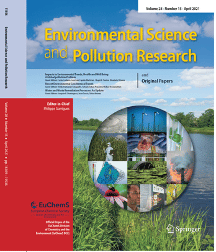
Special Issues
PRR: Preventing, Removing and Recycling. Pollutant Toxic Ions and Molecules
Environmental Science and Pollution Research by Springer Nature
Editor-in-Chief: Philippe Garrigues
5.190 (2021)
Impact factor
Guest Editors:
Prof. Carlos Lodeiro (LAQV-REQUIMTE – FCT Nova University Lisbon)
Prof. Jose Luis Capelo (PROTEOMASS SCIENTIFIC SOCIETY – LAQV-REQUIMTE – FCT Nova University Lisbon)
Dr. Elisabete Oliveira (LAQV-REQUIMTE – FCT Nova University Lisbon)
As Guest Editors of this collection of papers, We are inviting you to contribute a paper on your current research activities in your area of expertise. The special issue will feature both critical reviews and research papers. A review is expected to present a critical overview of the state-of-the-art of a topic, with critically selected examples (not only from your own work), to point the reader to trends and likely future developments and to give a selection of important references to the current literature. As a guideline, for a critical review the manuscript is expected to be around 35 000 characters in length, plus figures and tables. For a research paper, paper length must be appropriate to content. There is no strict page limit. You will find the journal’s instructions for authors on the ESPR homepage at http://www.springer.com/environment/journal/11356.
Furthermore, I am pleased to announce that color figures will be printed in color free-of-charge to the author, both in the online and print versions of the journal.
Open Submission date for papers: 10th December 2023.
Submission deadline: 1st April 2024, Earlier submissions are encouraged, as papers will be published online as soon as they have been accepted for publication. However, the final publication data will be until the special issue will be completed (2024).
During the submission please use the article type SI: PTIM2023.
Special Issue Link : https://www.springer.com/
All invited papers will be subject to the same rigorous peer-review process as regular submissions to the journal, and upon publication, each author team will be provided with a free pdf file of the printed article. The rejection rate for ESPR is around 70% for regular issues and around 40% for papers submitted to special issues. We ask that you submit your manuscript directly to the ESPR editorial office by online submission at http://www.editorialmanager.com/espr/.
We would very much appreciate your participation in this special issue and hope that you are able to accept this invitation.

















